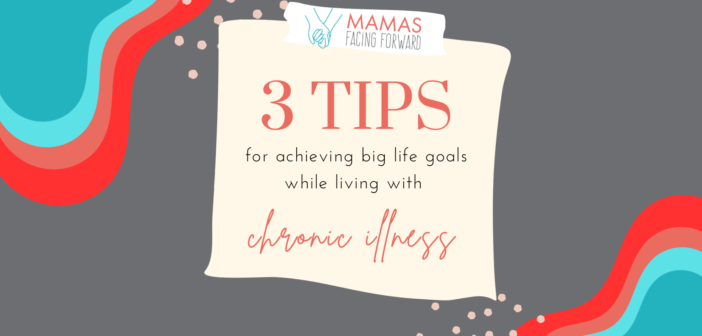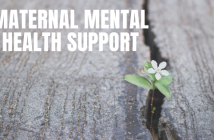When I was first diagnosed with rheumatoid arthritis (RA), I was 25 years old and in the middle of law school. I felt like I was just starting out in my life – and my mind kept racing trying to figure out what this diagnosis would mean for my life goals. Would I be able to graduate? Travel? Start a family? Stay active? What about all the things that were important to me? What about my life goals?
The uncertainty that comes with diagnosis of a lifelong chronic illness can make it feel really difficult to plan in advance. But living with a chronic illness shouldn’t mean giving up on life goals that are really important to you. Since my diagnosis over a decade ago, I’m happy to say that I’ve been able to achieve many big goals. I graduated from law school. I’ve had the opportunity to travel to Australia, China, and across the United States – refrigerated biologics in a portable cooler the whole way! And, of course, I have my three beautiful children.
As an example of how to approach big life goals while living with a chronic illness, I’m going to use what seemed like a pretty outrageous goal that I set for myself in 2016: riding in the Arthritis Foundation’s California Coast Classic. This annual fundraising event for the Arthritis Foundation is an eight day, 525-milke bike ride from San Francisco to Los Angeles. The ride is a huge challenge for any athlete, let alone a mom of small children living with rheumatoid arthritis who didn’t even own a road bike! Here are some of the strategies I used to achieve this big life goal:
1. Get input from your doctor.
Living with a chronic illness shouldn’t mean that you need to give up on goals that are important to you, but realistically speaking it does usually mean that you should discuss these goals with your doctor. Your doctor can help you figure out a realistic way to approach your goal within any limitations that are in place because of your health. They can also provide advice on how to keep from making things worse for yourself in the process of trying to achieve your goal.
In the case of the California Coast Classic, my rheumatologist approved of cycling as a form of low-impact exercise. I talked to my doctor well in advance of the actual event, and he was supportive of my decision to participate in the ride, as long as I committed to plenty of training in preparation.
As I got closer to the dates of the ride, my doctor provided temporary changes to some of my medications – such as providing extra pain medication and anti-inflammatory medication – to help me reach my goal. When my knees started giving me extra trouble in the month prior to the ride, he also gave me cortisone injections to help deal with that setback.
So as you set life goals while living with a chronic illness, don’t underestimate the importance of having your doctor as an ally. My doctor has worked with me to reach many of my life goals, from graduating law school to being able to dance at my wedding to treating my RA through my pregnancies and postpartum periods. And if you find that your doctor won’t support a life goal that is especially important to you, you may need to find a new doctor who will!
2. If you can, break big goals into more realistic pieces.
Though I did know people who lived with various forms of arthritis who had completed the California Coast Classic in the past, I started having real doubts about my goal almost as soon as I hit the registration button. Since being diagnosed with RA, I haven’t been nearly as active as I was prior to diagnosis. I didn’t even own a road bike and couldn’t remember the last time I had been on any kind of bike! I remember asking myself over and over again what on earth made me think I could possibly ride 50 to 80 miles a day, every day, for over a week?
Finally, I realized that the goal was simply too enormous to face all at once. I needed to break it up into more realistic pieces to keep myself from feeling completely overwhelmed. I started with super small tasks. Ride the exercise bike for ten minutes. Take a ride through the neighborhood even if you only go a couple of miles.
As I started to succeed with these small tasks, I felt a lot more confident about slowly increasing the intensity of the tasks. Get on your bike every day for a month, even if it’s only for a few miles. Take a longer ride on the weekend. It became easier for me to make each new task incrementally more challenging, and eventually I started to believe that maybe, just maybe, my large goal might be attainable.
3. Give yourself credit for what you accomplish and don’t compare.
Chronic illness comes with a lot of uncertainty, so we often have to approach goals differently than other people. This also means that we have to give ourselves credit for accomplishments that may seem small compared to others.
In the beginning of training for my big bike ride, for example, I struggled not to compare myself to other cyclists. I felt bad when it took me all day to ride miles that other cyclists could complete in a matter of hours. I felt discouraged that I would ever be able to achieve my larger goal.
To encourage myself to have a more positive outlook, I decided to start giving myself credit for whatever I was able to accomplish – and to stop comparing myself to others in different situations. Re-framing my focus to appreciate what I was able to accomplish really helped me with a more positive mindset. Instead of being frustrated that I didn’t make it as many miles as I had planned on a particular ride, I set my mind to enjoying being outside and riding as many miles as felt good for my body.
In the end, I didn’t end up riding every mile of the 525-mile California Coast Classic, but I completed a big portion of the course – and I absolutely achieved my own goal to do my best and enjoy the ride! I was proud of my accomplishment! I hope these tips are useful when it comes to considering your own life goals while living with a chronic illness.




